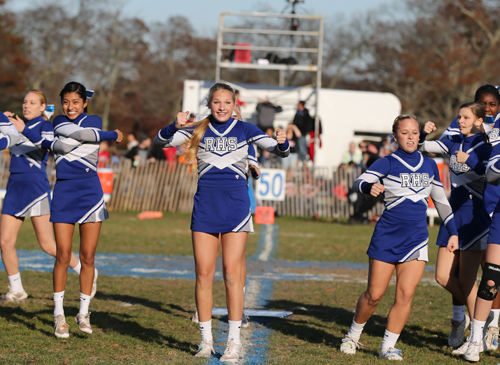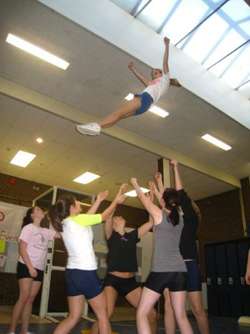Debate’s over: Cheerleading is a sport

Riverhead athletic director Bill Groth remembers attending cheerleading competitions for the first time sometime around the mid-90s. The Blue Waves were a newcomer to the competitive scene, a phenomenon just beginning to sweep Long Island.
“You go to those championships,” Groth said, “and you’re going to have one word come out: Wow.”
Over time, the Blue Waves have grown into one of the perennially strong teams in competitive cheerleading, a sport that’s as much gymnastics and dance as it is cheering.
For all the success Riverhead has enjoyed, the school’s athletes have never felt the satisfaction of seeing their sport officially recognized.
That changed Tuesday.
The New York State Board of Regents, which sets policy for public schools, unanimously approved cheerleading to be recognized as a sport in New York. The 17-0 vote Tuesday afternoon came on the heels of a recommendation made one day earlier by the P-12 education committee.
The vote allows the New York State Public High School Athletic Association to officially regulate cheerleading in the same manner it does every other sport.
The change, which would likely take effect next year, will allow for more uniform safety measures, stricter coaching certifications and a more structured schedule of competitions throughout the season, coaches said.
“I view it as it could be a really positive thing,” said Shoreham-Wading River cheerleading coach Tiffany Pelczar, who was a cheerleader at Riverhead and Hofstra University. “Anyone who’s a part of the sport really wants to see it move in a positive direction.”
Robert Zayas, executive director of NYSPHSAA, said in a statement that the change will allow athletes in cheerleading to be highlighted and promoted more with a championship event.
“Our association has been working on this initiative since 2009 and I am pleased to see the goal become a reality,” he said.
Many of the details remain unclear. The news came as a surprise to most in the cheerleading community.
“In terms of ironing out the details, that’s something we’re all going to be going through now,” Groth said. “But I think they’ve taken the major step. Now they’re in the batter’s box and we see what we do with it.”
In Riverhead, cheerleading has already been treated as a sport in terms of the support it receives from the athletic department. The majority of girls who participate compete in cheerleading year-round on the school team and club teams.
“For us it’s not going to change so much,” said Riverhead coach Stephanie Piraino, who was a cheerleader at Boston College. “It’s just going to be a positive thing for the recognition for the kids. And it will be nice to hopefully have a state championship that we can go to.”
More than 116,000 girls participated in competitive spirit squads nationally in 2012-13, according to an annual survey by the National Federation of State High School Associations. Competitive spirit squads ranked ninth in popularity for girls sports, ahead of sports like lacrosse, field hockey and golf.
Most states already recognize cheerleading as a sport, according to NYSPHSAA. New York is the 33rd state to do so.
Coaches said they don’t expect any changes to be made in terms of teams cheering in the traditional sense at football and basketball games.
Cheerleading season typically starts with tryouts in late spring. The teams train over the summer before competitions start in the fall. The season extends into the winter with national competitions in January and February.
“As coaches we kind of piecemeal a little bit our competitions that we do throughout the year,” Piraino said. “We look to see who’s offering what. This will hopefully allow the coaches to have a schedule. We know where we’re going.”
A bevy of for-profit organizations currently host cheerleading competitions. Groth said he thinks limiting that type of competition would be a good thing.
“You will diminish the influence of outside organizations and whatever agenda they bring to the plate and you will increase the agenda of an educationally based program,” he said.
There’s skepticism in the cheerleading community.
For years, teams have strived to compete in contests like the National High School Cheerleading Championships hosted by Universal Cheerleaders Association. The Blue Waves have gone to nationals the past 10 years, Piraino said, and the team fund-raises to pay for the trip.
“It was a great experience for the kids,” she said. “The competition is amazing.”

Pelczar said in speaking to coaches over the past two days, eligibility for those type of competitions is a major concern.
“For teams that have been competing in these events for years and years and bringing home trophies and awards, I think the concern is now that it is a recognized sport, we will not be able to compete in competitions outside the state.”
Pelczar is in her third year as Shoreham’s varsity coach, taking over at a time when students were fighting for the school to better support the program. At the time, the team often practiced in a tight space in the school’s hallway with substandard mats.
“I really wanted to push and advocate for these kids,” Pelczar said.
The program has been moving in the right direction, Pelczar said, with new uniforms and some new equipment on the way.
“It’s nice to kind of be on the same level as some of the other sports programs,” she said.
[email protected] Follow @joewerk








